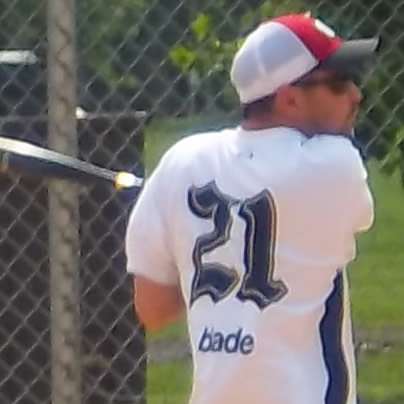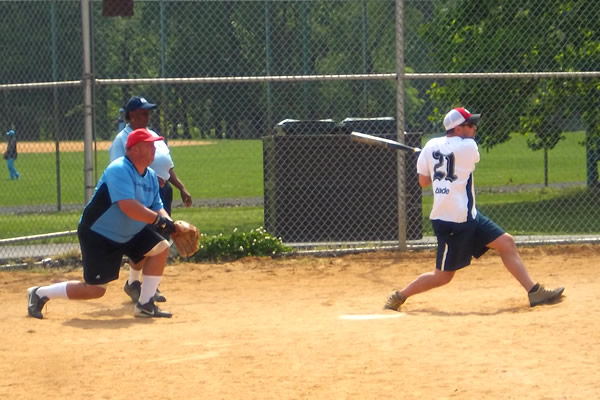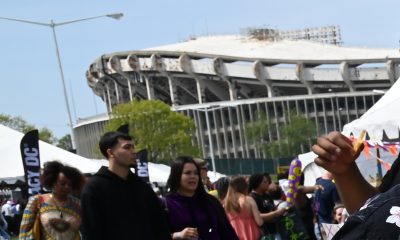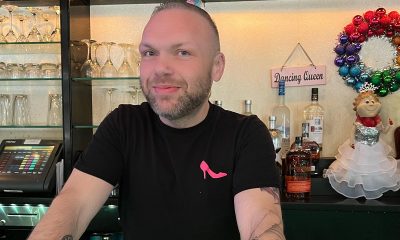Arts & Entertainment
Year in review: Getting in on the action
D.C. LGBT sports leagues boast bounty of 2012 activities, triumphs

This year was another incredible one for the LGBT sports community of Washington. There was an abundance of tournament play, leagues and national recognition.
Also, the continuing support of straight sports allies was bolstered by the creation of the You Can Play Project. The project was founded within the National Hockey League by Patrick Burke of the Philadelphia Flyers and has crossed over into other sports. They seek to challenge the culture of locker rooms and spectator areas by focusing only on an athlete’s skills and not his or her sexual identity. More info is at youcanplayproject.org.
Team D.C., the local LGBT sports connection, continued to set the standards for all LGBT sports communities. In 2012, its members awarded college scholarships to six local LGBT student athletes. Their popular United Night OUT series now includes events with seven Washington professional sports franchises.
Their efforts were also recognized nationally this year by the Compete Sports Network. The organization is at teamdc.org.
The Federal Triangles Soccer Club hosted the Women’s Winter Wrap-Up Indoor Cup in March and the Rehoboth Beach Classic in August. Along with play in various local leagues, members also hosted the Summer of Freedom League. They can be found at federaltriangles.org.
The District of Columbia Aquatics Club traveled to Reykjavik, Iceland in May where members captured second place in the large team category at the International Gay and Lesbian Aquatics Championships. In July they hosted the 21st annual Swim for Life, a fundraiser for HIV/AIDS as well as local watershed organizations. They are on the web at swimdcac.org.
Puck Buddys, the D.C.-based nationally recognized ice hockey blog, continues to entertain with their banter throughout the mess of the National Hockey League lockout. The blog is located at puckbuddys.com.
The Stonewall Kickball league maxed out on their league cap of 480 players in both of their seasons in 2012. Look for continued success in 2013. They can be found at stonewallsports.org.
The D.C. Sentinels basketball team traveled to three national tournaments in 2012 winning the Upper B-Division at the Hurricane Classic in Fort Lauderdale.
In January, they will launch the first season of the Washington D.C. Gay Basketball League. More information on the group is at teamdcbasketball.org.
The D.C. Gay Flag Football League had another stellar year hosting their spring season and growing to 270 players in their fall season. All the league action including videos is at dcgffl.org.
Charm City Volleyball hosted the Charm City Invitational 28 in April with one of their squads winning the BB Division. Their information is at volleybaltimore.org.
The Capital Area Rainbowlers Association continues to offer multiple bowling leagues and in October hosted the annual Capital Halloween Invitational Tournament.
On Monday they will be hosting New Year’s Bowling Eve from 9 p.m.-1 a.m. at Bowl America Shirley in Alexandria. More info is at carabowling.org.
The D.C. Strokes Rowing Club hosted Stonewall Regatta XIX in June. At the end of August, their Men’s Heavyweight B 8+ team brought home the gold at the US Rowing Master National Championships in Worcester, Mass. The Strokes are at dcstrokes.org.
The Chesapeake and Potomac Softball League (CAPS) completed a successful 2012 softball season. In October they hosted their annual tournament, the Mid-Atlantic Gay Invitational Classic.
In August of 2013, the CAPS will be hosting the 37th annual North American Gay Amateur Athlete Alliance Gay Softball World Series in Washington. The CAPS can be found at capssoftball.org.
The Washington Renegades Rugby Football Club wrapped up two successful seasons of league play this year with both squads having winning records. The Renegades compete in Division III of the Potomac Rugby Union and their Reds squad and won Hellfest in Dallas for the second year in a row. More info is at dcrugby.com.
The Adventuring outdoors group continues their summer bike series and weekly year round hikes. This is the “go to” group for anyone wanting to get outside and learn about the rich history of D.C. area. Their schedule is at adventuring.org.
All the local LGBT sports teams and clubs can be found at teamdc.org. Thanks to all of them for a great year.
Photos
PHOTOS: Montgomery County Pride in the Plaza
LGBTQ celebration held in downtown Silver Spring

Montgomery County Pride in the Plaza was held on Sunday, June 29 at Veterans Plaza in Silver Spring, Md.
(Washington Blade photos by Michael Key)























The fifth annual Fredericksburg Pride march and festival was held on Saturday, June 28. A march through the streets of downtown Fredericksburg, Va. was followed by a festival at Riverfront Park.
(Washington Blade photos by Michael Key)



















India
Anaya Bangar challenges ban on trans women in female cricket teams
Former Indian cricketer Sanjay Bangar’s daughter has received support

Anaya Bangar, the daughter of former Indian cricketer Sanjay Bangar, has partnered with the Manchester Metropolitan University Institute of Sport in the U.K. to assess her physiological profile following her gender-affirming surgery and undergoing hormone replacement therapy.
From January to March 2025, the 23-year-old underwent an eight-week research project that measured her glucose levels, oxygen uptake, muscle mass, strength, and endurance after extensive training.
The results, shared via Instagram, revealed her metrics align with those of cisgender female athletes, positioning her as eligible for women’s cricket under current scientific standards. Bangar’s findings challenge the International Cricket Council’s 2023 ban on transgender athletes in women’s cricket, prompting her to call for a science-based dialogue with the Board of Control for Cricket in India and the ICC to reform policies for trans inclusion.
“I am talking with scientific evidence in my hand,” Bangar said in an interview posted to her Instagram page. “So, I hope, this makes an impact and I will be hoping to BCCI and ICC talking with me and discussing this further.”
On Nov. 21, 2023, the ICC enacted a controversial policy barring trans women from international women’s cricket. Finalized after a board meeting in Ahmedabad, India, the regulation prohibits any trans player who has experienced male puberty from competing, irrespective of gender-affirming surgery or hormone therapy. Developed through a 9-month consultation led by the ICC’s Medical Advisory Committee, the rule aims to safeguard the “integrity, safety, and fairness” of women’s cricket but has drawn criticism for excluding athletes like Canada’s Danielle McGahey, the first trans woman to play internationally. The policy, which allows domestic boards to set their own rules, is slated for review by November 2025.
Bangar shared a document on social media verifying her participation in a physiological study at the Manchester Metropolitan University Institute of Sport, conducted from Jan. 20 to March 3, 2025, focused on cricket performance. The report confirmed that her vital metrics — including hemoglobin, blood glucose, peak power, and mean power — aligned with those of cisgender female athletes. Initially, her fasting blood glucose measured 6.1 mmol/L, slightly above the typical non-diabetic range of 4.0–5.9 mmol/L, but subsequent tests showed it normalized, reinforcing the study’s findings that her physical profile meets female athletic standards.
“I am submitting this to the BCCI and ICC, with full transparency and hope,” said Bangar. “My only intention is to start a conversation based on facts not fear. To build space, not divide it.”
In a letter to the BCCI and the ICC, Bangar emphasized her test results from the Manchester Metropolitan University study. She explained that the research aimed to assess how hormone therapy had influenced her strength, stamina, hemoglobin, glucose levels, and overall performance, benchmarked directly against cisgender female athletic standards.
Bangar’s letter to the BCCI and the ICC clarified the Manchester study was not intended as a political statement but as a catalyst for a science-driven dialogue on fairness and inclusion in cricket. She emphasized the importance of prioritizing empirical data over assumptions to shape equitable policies for trans athletes in the sport.
Bangar urged the BCCI, the world’s most influential cricket authority, to initiate a formal dialogue on trans women’s inclusion in women’s cricket, rooted in medical science, performance metrics, and ethical fairness. She called for the exploration of eligibility pathways based on sport-specific criteria, such as hemoglobin thresholds, testosterone suppression timelines, and standardized performance testing. Additionally, she advocated for collaboration with experts, athletes, and legal advisors to develop policies that balance inclusivity with competitive integrity.
“I am releasing my report and story publicly not for sympathy, but for truth. Because inclusion does not mean ignoring fairness, it means measuring it, transparently and responsibly,” said Bangar in a letter to the BCCI. “I would deeply appreciate the opportunity to meet with you or a representative of the BCCI or ICC to present my findings, discuss possible policy pathways, and work towards a future where every athlete is evaluated based on real data, not outdated perceptions.”
Before her transition, Bangar competed for Islam Gymkhana in Mumbai and Hinckley Cricket Club in the U.K., showcasing her talent in domestic cricket circuits. Her father, Sanjay Bangar, was a dependable all-rounder for the Indian national cricket team from 2001 to 2004, playing 12 test matches and 15 One Day Internationals. He later served as a batting coach for the Indian team from 2014 to 2019, contributing to its strategic development.
Cricket in India is a cultural phenomenon, commanding a fanbase of more than 1 billion, with more than 80 percent of global cricket viewership originating from the country.
The International Cricket Council, the sport’s governing body, oversees 12 full member nations and more than 90 associate members, with the U.S. recently gaining associate member status in 2019 and co-hosting the 2024 ICC Men’s T20 World Cup. The BCCI generated approximately $2.25 billion in revenue in the 2023–24 financial year, primarily from the Indian Premier League, bilateral series, and ICC revenue sharing. The ICC earns over $3 billion from media rights in India alone for the 2024–27 cycle, contributing nearly 90 percent of its global media rights revenue, with the BCCI receiving 38.5 percent of the ICC’s annual earnings, approximately $231 million per year.
Women’s cricket in India enjoys a growing fanbase, with over 300 million viewers for the Women’s Premier League in 2024, making it a significant driver of the sport’s global popularity. The International Cricket Council oversees women’s cricket in 12 full member nations and over 90 associate members, with the U.S. fielding a women’s team since gaining associate status in 2019 and competing in ICC events like the 2024 Women’s T20 World Cup qualifiers. The BCCI invests heavily in women’s cricket, allocating approximately $60 million annually to the WPL and domestic programs in 2024–25, while contributing to the ICC’s $20 million budget for women’s cricket development globally. India’s media market for women’s cricket, including WPL broadcasting rights, generated $120 million in 2024, accounting for over 50 percent of the ICC’s women’s cricket media revenue.
“As a woman, I feel when someone says that they are women, then they are, be trans or cis. A trans woman is definitely the same as a cis woman emotionally and in vitals, and specially, when someone is on hormone replacement therapy. Stopping Anaya Bangar from playing is discrimination and violation of her rights. It is really sad and painful that every trans woman need to fight and prove their identity everywhere,” said Indrani Chakraborty, an LGBTQ rights activist and a mother of a trans woman. “If ICC and BCCI is stopping her from playing for being transgender, then I will say this to be their lack of awareness and of course the social mindsets which deny acceptance.”
Chakraborty told the Blade that Bangar is an asset, no matter what. She said that the women’s cricket team will only benefit by participation, but the discriminating policies are the hindrance.
“Actually the transgender community face such discrimination in every sphere. In spite of being potent, they face rejection. This is highly inhuman. These attitudes is regressive and will never let to prosper. Are we really in 2025?,” said Chakraborty. “We, our mindset and the society are the issues. We, as a whole, need to get aware and have to come together for getting justice for Anaya. If today, we remain silent, the entire community will be oppressed. Proper knowledge of gender issues need to be understood.”
The BCCI and the International Cricket Council have not responded to the Blade’s repeated requests for comment.





















